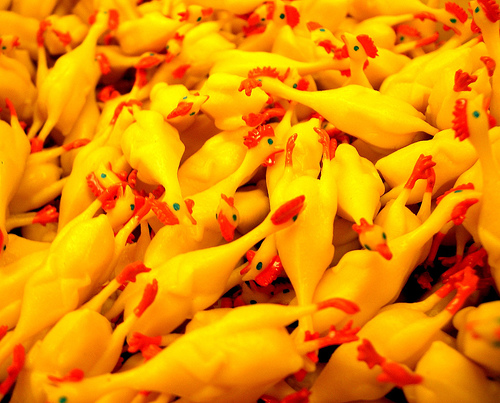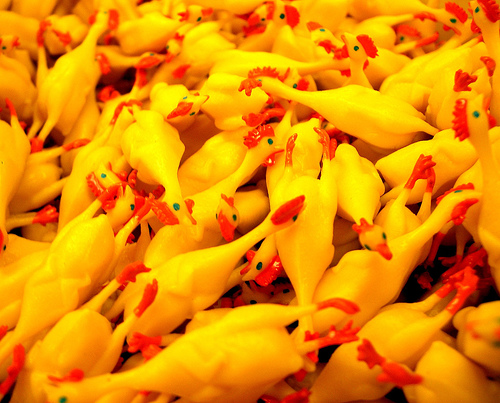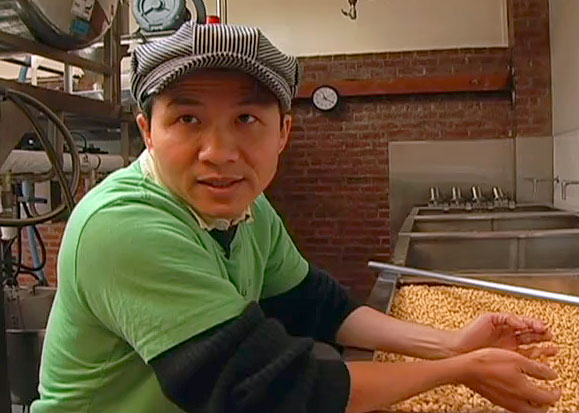Send your question to Umbra!
Q. Dear Umbra,
I’ve significantly cut down on my meat intake in the past few years, although I still enjoy fish or a turkey sandwich now and then. I try to eat more “whole food” choices (beans, lentils, whole wheat) in lieu of meat, but occasionally I give into fake meat products. Sometimes fake chicken stir-fry is really satisfying, but I’m still a little suspicious about how good the production and consumption of fake meat really is for our bodies and the planet. How do you rate fake meat? Is it possible to make your own fake meat at home?
Jeremy
Worcester, MA
 Beware fake chickens.Photo: zoomarA. Dearest Jeremy,
Beware fake chickens.Photo: zoomarA. Dearest Jeremy,
Good work there eating less meat, Jeremy. Given livestock is the cause of 18 percent of greenhouse-gas emissions, turns out eating less meat is not only a good thing for our health but the planet’s too. The average American eats more than 200 pounds of flesh a year, about 21,000 entire animals in a lifetime. Thanks to people like you, momentum is growing around meatless Mondays — and less meat on other days too.
So what’s the best thing to eat when you want that meaty sensation without involving livestock? Not dogs, Canadian fakin’, Chik’n nuggets all have fun names. But are those tofu pups barking up the wrong tree? Does processed fake meat make the grade?
As Grist’s Lou Bendrick notes, “Though soy and processed, faux-meat products have their own sets of problems (soy is a heavily sprayed, often genetically modified mono-crop, and eating too much of it may cause some serious side effects), they really can’t compete with the nastiness of hot dogs.”
That said, given the ubiquity and problems of the mass production world-wide of GMO soy, even eating a meat-free burger can contribute to deforestation, water depletion, and pesticide pollution, if we’re not careful. For starters, if you get a pre-made patty, look for one that is organic.
Now as much as I love an organic Boca burger, many pre-made meat analogues are essentially junk food — junky healthwise and environmentally. One ought to be weary of packages sporting clever names and extolling the product’s health benefits.
In the ingredients you may well find soy protein and soy protein isolate, two major reasons fake meat products are not so sustainable. Emulsifiers that give fake meat products that “meaty” texture, soy protein and soy protein isolate are extracted from soybeans with hexane, which the Environmental Protection Agency (EPA) calls a “hazardous air pollutant.” Hexane can cause nervous system failure and skin disorders.
Other reason to hold the fakin’? Consider that fake bacon comes painted with artificial colors and full of soy protein concentrate. That’s a bit too much fakin’ for my plate. (I admit, every 5 years or so I’ll eat a strip. All things in moderation.)
So don’t be rude, avoid processed foods. You’d be wise to do as Michael Pollan suggests, “Eat Food. Not too much. Mostly plants.” Be faux real! Stick to the “whole foods” you’ve been partaking in, Jeremy.
You’ll find those real, whole foods make a toothy, juicy fake meat meal at home. Consider making portobello mushroom burgers, lentil patties, chickpea patties, or black bean burgers. Tastewise, a Big Mac has nothing on an eggplant stack. Mmmm. Makes me hungry just thinking about it. There’s a lot you can do with organic tofu too. And tempeh is a much healthier and more sustainable take on steak.
I think I hear your stomach growling, Jeremy. Oh wait, that’s mine. I’m off to make a tofu salad sandwich. Bon appetit!
Hungrily,
Umbra
Links for more meat-free fun:
For great tofu and tempeh recipes, go here.
Want inspiring ideas for meat substitutes? Read this.
Watch my meaty video with comedians Dave Attell (“Insomniac”), Lizz Winstead (co-creator of “The Daily Show”), Gary Gulman (“Last Comic Standing”), and Myq Kaplan (vegan Comedian and New York’s “Funniest Standup Winner”).



